外研版(2019)选择性必修第三册Unit 6 Nature in Words Using language 课件-(共30张PPT)
文档属性
| 名称 | 外研版(2019)选择性必修第三册Unit 6 Nature in Words Using language 课件-(共30张PPT) |

|
|
| 格式 | pptx | ||
| 文件大小 | 599.2KB | ||
| 资源类型 | 教案 | ||
| 版本资源 | 外研版(2019) | ||
| 科目 | 英语 | ||
| 更新时间 | 2024-05-17 18:36:04 | ||
图片预览

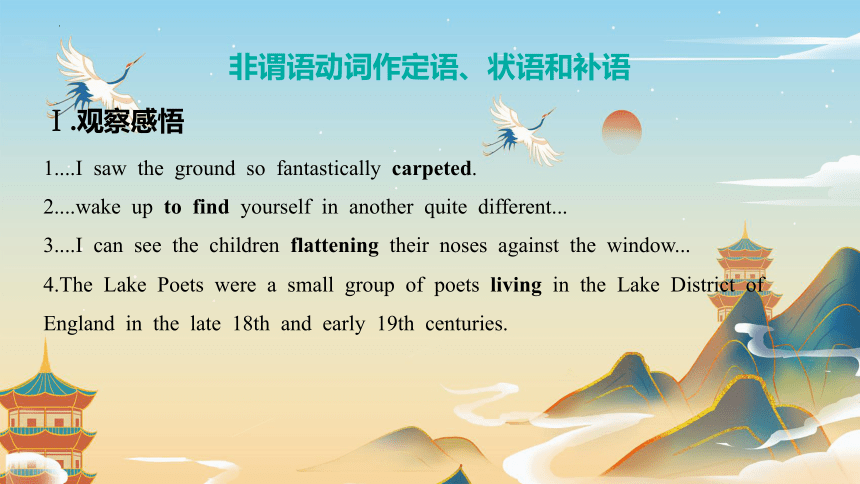
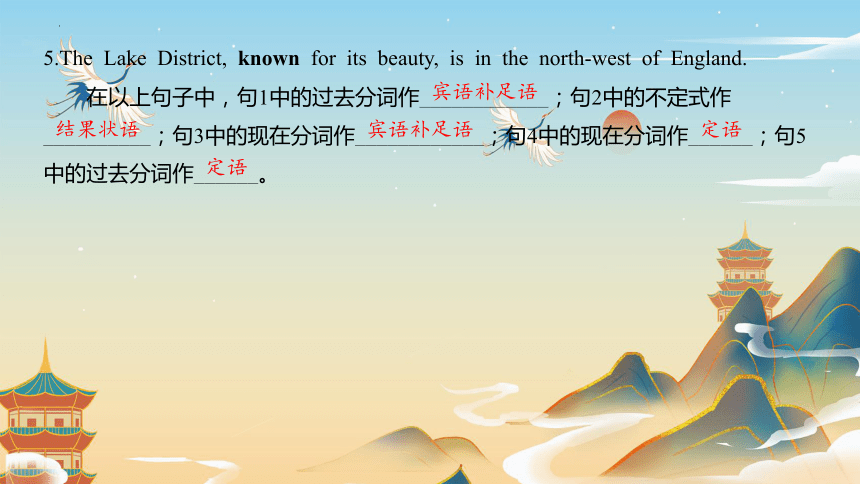
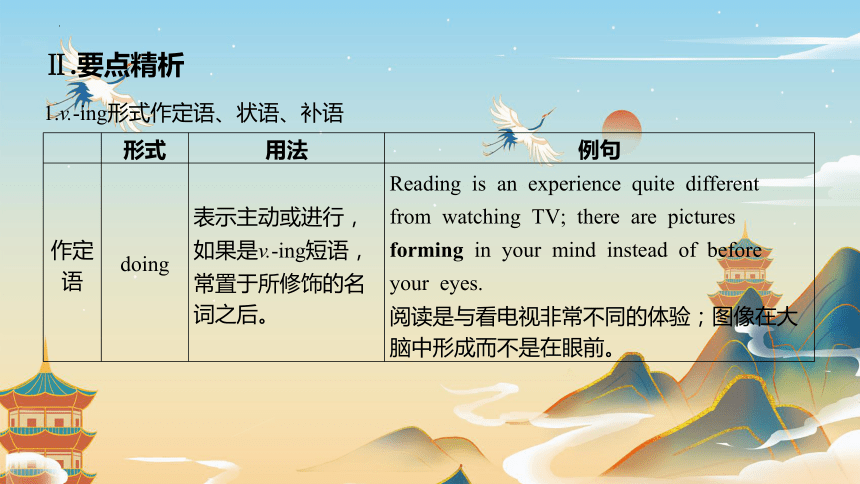
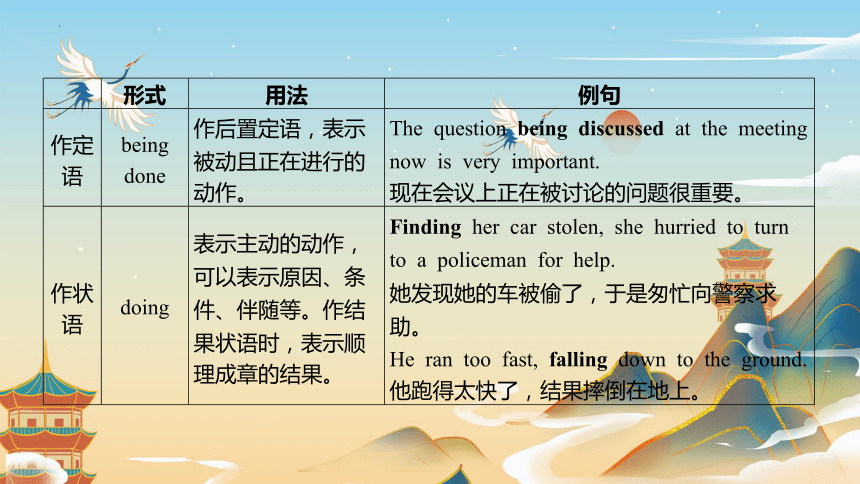
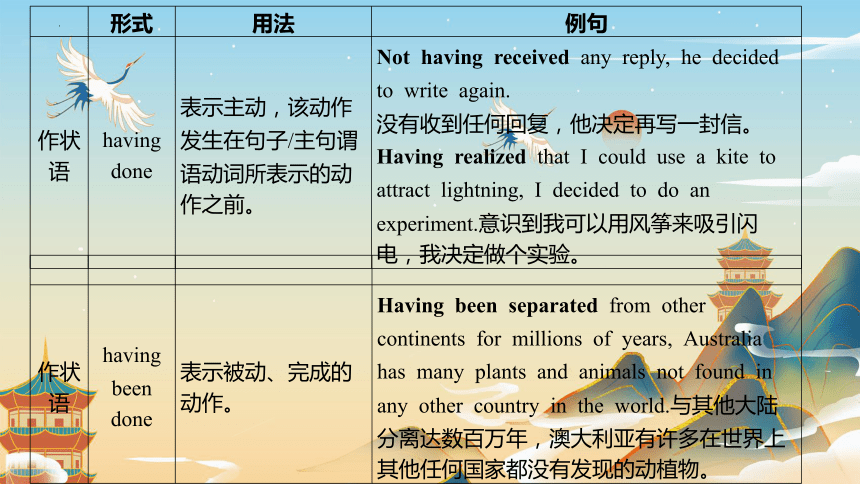
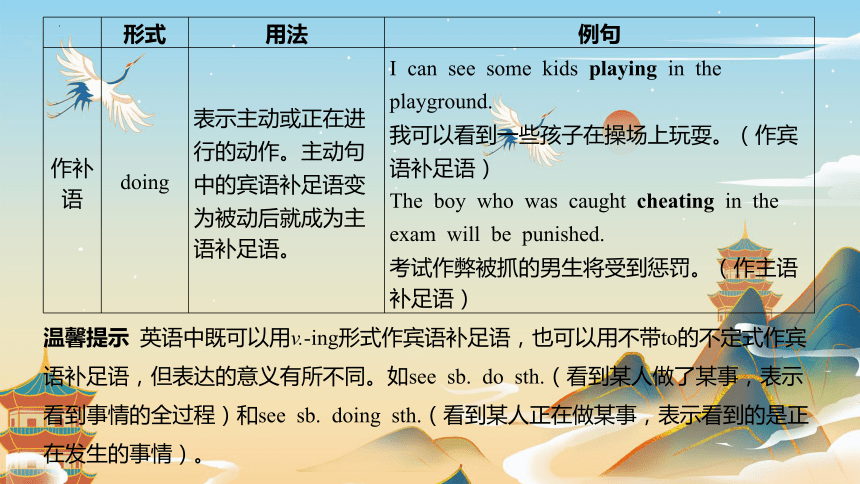
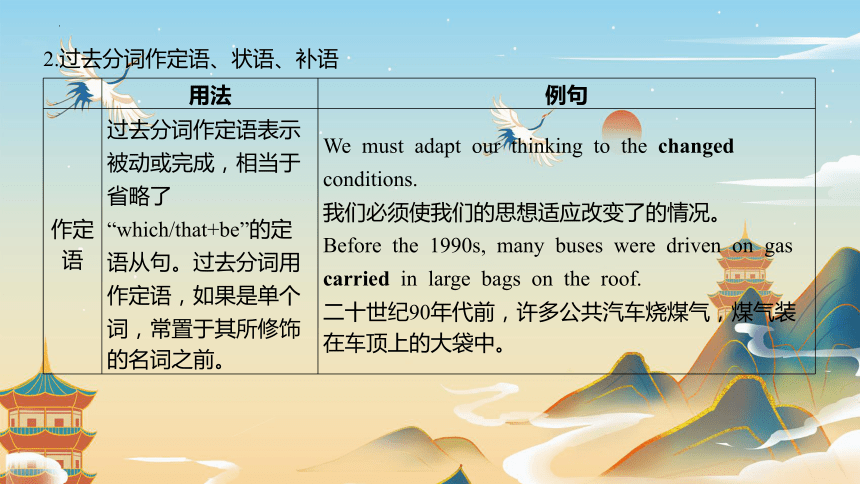
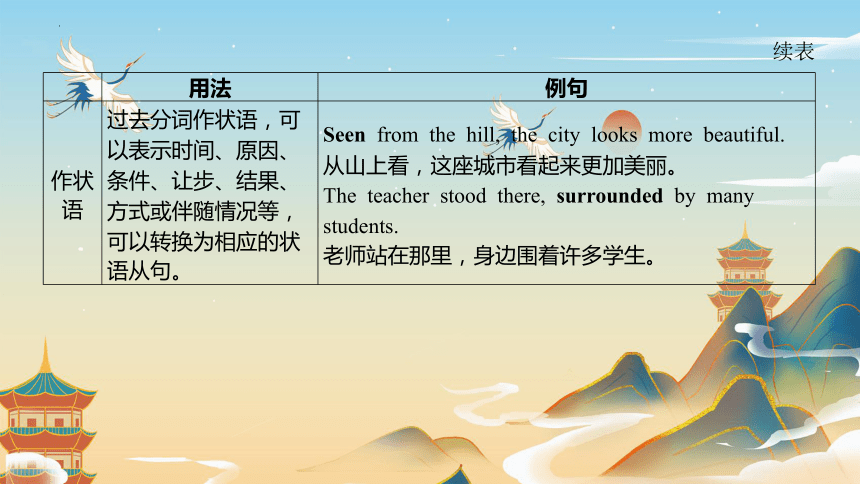
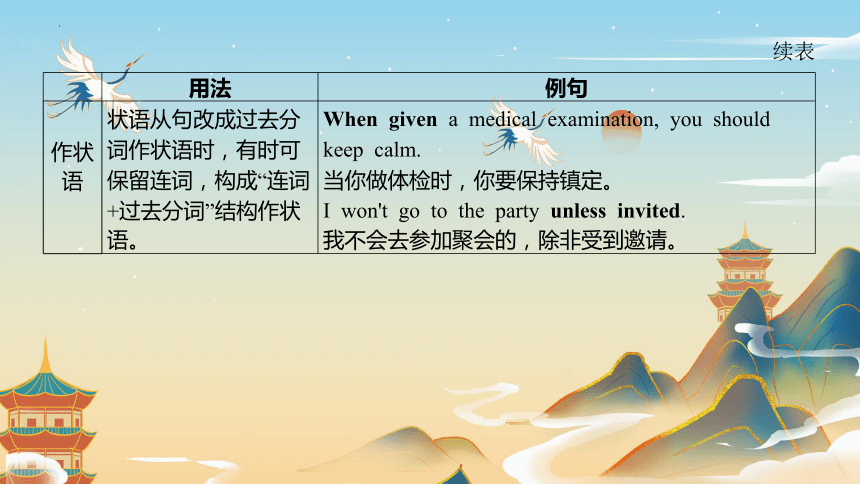
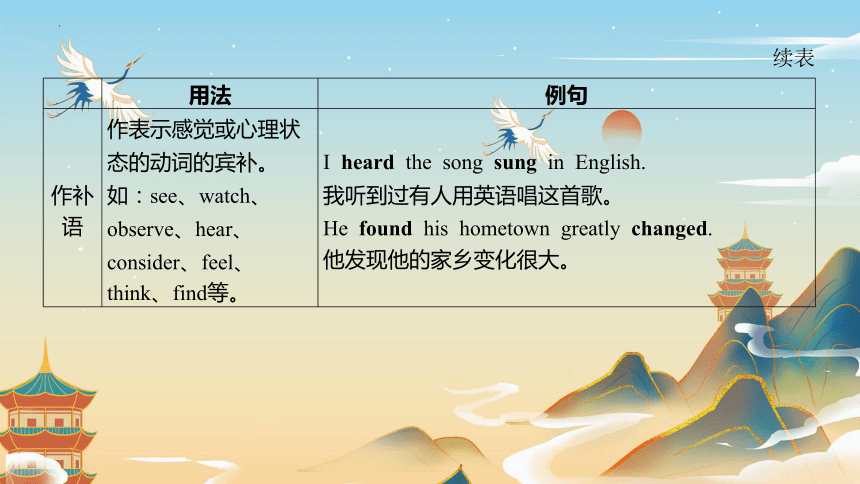

文档简介
(共30张PPT)
Unit 6 Nature in words
Section Ⅲ Using language
非谓语动词作定语、状语和补语
Ⅰ.观察感悟
1....I saw the ground so fantastically carpeted.
2....wake up to find yourself in another quite different...
3....I can see the children flattening their noses against the window...
4.The Lake Poets were a small group of poets living in the Lake District of England in the late 18th and early 19th centuries.
5.The Lake District, known for its beauty, is in the north-west of England.
在以上句子中,句1中的过去分词作____________;句2中的不定式作
__________;句3中的现在分词作____________;句4中的现在分词作______;句5
中的过去分词作______。
宾语补足语
结果状语
宾语补足语
定语
定语
Ⅱ.要点精析
1.v.-ing形式作定语、状语、补语
形式 用法 例句
作定 语 doing 表示主动或进行, 如果是v.-ing短语, 常置于所修饰的名 词之后。 Reading is an experience quite different
from watching TV; there are pictures
forming in your mind instead of before
your eyes.
阅读是与看电视非常不同的体验;图像在大
脑中形成而不是在眼前。
形式 用法 例句
作定 语 being done 作后置定语,表示 被动且正在进行的 动作。 The question being discussed at the meeting
now is very important.
现在会议上正在被讨论的问题很重要。
作状 语 doing 表示主动的动作, 可以表示原因、条 件、伴随等。作结 果状语时,表示顺 理成章的结果。 Finding her car stolen, she hurried to turn
to a policeman for help.
她发现她的车被偷了,于是匆忙向警察求
助。
He ran too fast, falling down to the ground.
他跑得太快了,结果摔倒在地上。
形式 用法 例句
作状 语 having done 表示主动,该动作 发生在句子/主句谓 语动词所表示的动 作之前。 Not having received any reply, he decided
to write again.
没有收到任何回复,他决定再写一封信。
Having realized that I could use a kite to
attract lightning, I decided to do an
experiment.意识到我可以用风筝来吸引闪
电,我决定做个实验。
作状 语 having been done 表示被动、完成的 动作。 Having been separated from other
continents for millions of years, Australia
has many plants and animals not found in
any other country in the world.与其他大陆
分离达数百万年,澳大利亚有许多在世界上
其他任何国家都没有发现的动植物。
形式 用法 例句
作补 语 doing 表示主动或正在进 行的动作。主动句 中的宾语补足语变 为被动后就成为主 语补足语。 I can see some kids playing in the
playground.
我可以看到一些孩子在操场上玩耍。(作宾
语补足语)
The boy who was caught cheating in the
exam will be punished.
考试作弊被抓的男生将受到惩罚。(作主语
补足语)
温馨提示 英语中既可以用v.-ing形式作宾语补足语,也可以用不带to的不定式作宾语补足语,但表达的意义有所不同。如see sb. do sth.(看到某人做了某事,表示看到事情的全过程)和see sb. doing sth.(看到某人正在做某事,表示看到的是正在发生的事情)。
2.过去分词作定语、状语、补语
用法 例句
作定 语 过去分词作定语表示 被动或完成,相当于 省略了 “which/that+be”的定 语从句。过去分词用 作定语,如果是单个 词,常置于其所修饰 的名词之前。 We must adapt our thinking to the changed
conditions.
我们必须使我们的思想适应改变了的情况。
Before the 1990s, many buses were driven on gas
carried in large bags on the roof.
二十世纪90年代前,许多公共汽车烧煤气,煤气装
在车顶上的大袋中。
用法 例句
作状 语 过去分词作状语,可 以表示时间、原因、 条件、让步、结果、 方式或伴随情况等, 可以转换为相应的状 语从句。 Seen from the hill, the city looks more beautiful.
从山上看,这座城市看起来更加美丽。
The teacher stood there, surrounded by many
students.
老师站在那里,身边围着许多学生。
续表
用法 例句
作状 语 状语从句改成过去分 词作状语时,有时可 保留连词,构成“连词 +过去分词”结构作状 语。 When given a medical examination, you should
keep calm.
当你做体检时,你要保持镇定。
I won't go to the party unless invited.
我不会去参加聚会的,除非受到邀请。
续表
用法 例句
作补 语 作表示感觉或心理状 态的动词的宾补。 如:see、watch、 observe、hear、 consider、feel、 think、find等。 I heard the song sung in English.
我听到过有人用英语唱这首歌。
He found his hometown greatly changed.
他发现他的家乡变化很大。
续表
用法 例句
作补 语 表示“使;让”的动词 后常接过去分词作宾 补。如:have、get、 keep、leave、make 等。 I'll have my hair cut tomorrow.明天我要理发。
He got his tooth pulled out yesterday.他昨天把牙
拔了。
Don't leave those things undone.要把那些事情做
完。
He spoke in a louder voice in order to make
himself heard.
他更大声地讲话,以便让别人听到。
作表示“希望;要求”的动词的宾补。如:order、want、wish等。 We want the work finished by Monday.
我们希望该工作在星期一之前完成。
续表
3.不定式作定语、状语、补语
用法 例句
作定 语 往往表示要做的事情。且不 定式通常要放在被修饰的词 后。 He has nothing to do.他无事可做。
We reached an agreement to do the work
together.
我们达成协议共同做这项工作。
They made a plan to develop new products.
他们制订了一个研制新产品的计划。
用法 例句
作状 语 不定式作状语可以表示目 的、结果、原因等。不定式 作目的状语,常常置于句 首,如果置于句尾,不定式 前面常常没有逗号。 I stayed there to see what would happen.
我留在那里看看会发生什么事。
I returned home that day to find that
everything was in good order.
那天我回到家,却发现一切都那么井井有
条。
I am sorry to hear that.
听到那件事我很难过。
续表
用法 例句
作补 语 常见的用带to的不定式作宾 语补足语的词有:allow、 ask、beg、cause、forbid、 force、invite、persuade、 request、teach、tell、 remind、want、warn、wish、 advise、encourage等。 We don't allow them to take away any
books from our library.
我们不允许他们带走我们图书馆的任何书。
Finally we persuaded them to stay with us.
最后我们说服了他们和我们一起留下来。
续表
用法 例句
作补 语 常见的用不带to的不定式作宾语补足语的词有:感官动词(feel、hear、notice、see、watch、listen to等)和使役动词(如have、let、make)。注意:在主动语态中,用不带to的不定式作宾语补足语,在被动语态中,动词不定式符号to要还原, 动词不定式转而作主语补足语。 I noticed them come in.
我注意到他们进来了。(作宾语补足语)
I won't have him cheat me like that.
我不会让他这样骗我。(作宾语补足语)
Someone was heard to open the door.
听见有人开门。(作主语补足语)
续表
Ⅲ.实战演练
单句语法填空
1. He said that many words __________(describe)nature were being added to
the new version of the junior dictionary.
describing
2. I heard him ________(sing) in the next room.
singing
3. American millionaires' rooms were filled with art works _________(import)
from Europe.
imported
4. They represent the earth ________(come) back to life and best wishes for
new beginnings.
coming
5. Agriculture gave people their first experience of the power of technology
__________(change) lives.
to change
6. When I walked along the street yesterday afternoon, I saw an old man
________(play) the violin.
playing
7. _____(lose) in thought, Mr. Lee didn't hear the sound outside.
Lost
8. With all the work ________(finish), I left the company and went to the
bookstore to buy some books for my daughter.
finished
9. The explorers went into the cave with some equipment, _______(hope) to
find some valuable treasures.
hoping
10. The Greens will do everything they can ________(save) the injured dog.
to save
11. They went to the airport in a hurry, only_______(find) that their flight had
been put off.
to find
12. The Great Wall of China, _______(know) as one of the 7 Wonders of the
World, attracts a large number of tourists every year.
known
语篇填空
The truth that trees are vital to our life is not a secret. They provide us
with food, wood and most importantly, oxygen. Now there is one more thing we
can add to this list—1._________(block) out harmful bacteria from water.
The discovery was made by a team 2.__________(consist) of scientists
from the Massachusetts Institute of Technology (MIT) and high school students
who were seeking a natural water filter(过滤器)—one that would help
communities in 3.___________(develop) countries that do not have access to
modern water filter systems.
blocking
consisting
developing
The researchers, 4.____(lead) by Professor Rohit Karnik, decided
5._______(turn) to trees for help because they could allow liquid 6.________
(flow) through, while blocking out air bubbles.
They began by cutting 1.5-inch-wide sections of tree bark from the branches
of a white pine tree.The people 7._______(relate) then tested the wood's
filtering ability by pouring water 8.__________(contain) red dye particles of
different sizes through. To their amazement, they found that it was effective in
trapping all the particles. 9.___________(encourage), the team conducted
another experiment, this time with water that contained bacteria. Sure enough, the
sapwood held back 99% of the bacteria, 10._________(allow) only 1% to flow
through.
led
to turn
to flow
related
containing
Encouraged
allowing
1 fade v.逐渐消失;褪色
情境佳句
①If you hang your clothes out in the sun long, they will fade.如果你长时间把衣服晾在阳光下,它们会褪色的。
②The effect of the international financial crisis is fading away.国际金融危机的影响正逐渐减弱。
③He saw the monitor black out and a few words faded in.
他看见屏幕变暗,渐渐显示出了几个字。
归纳拓展
fade away逐渐消失;(人)衰弱,病重死亡
fade in(画面)淡入,渐显;(声音)渐强
fade out(画面)淡出,渐隐;(声音)渐弱
学以致用
[单句语法填空/完成句子/单句写作]
① This young man has a wide knowledge of painting and music, so I am sure
that his strength will fade ___ a few years later.
in
② 说话声越来越大,越来越近,接着又逐渐消失了。
The voices became louder and closer and _____________________.
then faded away again
③ 这种材料的主要缺点是在强烈的阳光下会褪色。
_________________________________________________________________
The main disadvantage of the material is that it fades in strong sunlight.
2 sweep v.吹过, 掠过;打扫
情境佳句
①They say they will sweep away the administration and introduce new methods.
他们说要取消那种管理而采用新方法。
②Chinese people would sweep out their houses before the Spring Festival.在春节前,中国人会打扫干净房屋。
③A feeling of isolation swept over me.
忽然有一种孤独的感觉向我袭来。
归纳拓展
sweep away彻底清除;消灭
sweep across席卷
sweep out打扫干净,清扫干净(房间等)
sweep over突然袭来
学以致用
[单句语法填空/单句写作]
① That will be a good time to sweep ____ the room.
out
② A deadly fear swept _____ him.
over
③ A sudden feeling of grief swept all my anger ______.
away
④ 学生们正在打扫教室的地面。
________________________________________________
The students are sweeping the floor of the classroom.
3 感叹句
情境佳句
①What beautiful weather it is!天气真好!
②What a brave boy you are!
你是一个多么勇敢的男孩子啊!
③How well she plays!她演奏得多么好啊!
④How interesting a story it is!
这是个多么有趣的故事啊!
⑤How time flies!时间过得真快!
归纳拓展
英语中的感叹句通常以how或what开头,其中what后接名词,how修饰形容词或副词。根据感叹句的不同结构,我们可以将它归纳为以下句型:
What+名词+主语+谓语!(其中的“主语+谓语”通常可以省略)
What+a/an+形容词+可数名词单数+主语+谓语!
What+形容词+复数名词/不可数名词+主语+谓语!
How+形容词/副词+主语+谓语!
How+形容词+a/an+可数名词单数+主语+谓语!
How+主语+谓语!
学以致用
[单句语法填空/完成句子]
① ______ fast he drives!
How
② ______ a surprise!
What
③ What ___ slow train this is!
a
④ 你不能和我们一起来真可惜啊!
____________________ that you can't come with us!
What a pity (it is)
⑤ 你给我们带来了多么令人兴奋的消息啊!
___________________ you've brought us!
What exciting news
Unit 6 Nature in words
Section Ⅲ Using language
非谓语动词作定语、状语和补语
Ⅰ.观察感悟
1....I saw the ground so fantastically carpeted.
2....wake up to find yourself in another quite different...
3....I can see the children flattening their noses against the window...
4.The Lake Poets were a small group of poets living in the Lake District of England in the late 18th and early 19th centuries.
5.The Lake District, known for its beauty, is in the north-west of England.
在以上句子中,句1中的过去分词作____________;句2中的不定式作
__________;句3中的现在分词作____________;句4中的现在分词作______;句5
中的过去分词作______。
宾语补足语
结果状语
宾语补足语
定语
定语
Ⅱ.要点精析
1.v.-ing形式作定语、状语、补语
形式 用法 例句
作定 语 doing 表示主动或进行, 如果是v.-ing短语, 常置于所修饰的名 词之后。 Reading is an experience quite different
from watching TV; there are pictures
forming in your mind instead of before
your eyes.
阅读是与看电视非常不同的体验;图像在大
脑中形成而不是在眼前。
形式 用法 例句
作定 语 being done 作后置定语,表示 被动且正在进行的 动作。 The question being discussed at the meeting
now is very important.
现在会议上正在被讨论的问题很重要。
作状 语 doing 表示主动的动作, 可以表示原因、条 件、伴随等。作结 果状语时,表示顺 理成章的结果。 Finding her car stolen, she hurried to turn
to a policeman for help.
她发现她的车被偷了,于是匆忙向警察求
助。
He ran too fast, falling down to the ground.
他跑得太快了,结果摔倒在地上。
形式 用法 例句
作状 语 having done 表示主动,该动作 发生在句子/主句谓 语动词所表示的动 作之前。 Not having received any reply, he decided
to write again.
没有收到任何回复,他决定再写一封信。
Having realized that I could use a kite to
attract lightning, I decided to do an
experiment.意识到我可以用风筝来吸引闪
电,我决定做个实验。
作状 语 having been done 表示被动、完成的 动作。 Having been separated from other
continents for millions of years, Australia
has many plants and animals not found in
any other country in the world.与其他大陆
分离达数百万年,澳大利亚有许多在世界上
其他任何国家都没有发现的动植物。
形式 用法 例句
作补 语 doing 表示主动或正在进 行的动作。主动句 中的宾语补足语变 为被动后就成为主 语补足语。 I can see some kids playing in the
playground.
我可以看到一些孩子在操场上玩耍。(作宾
语补足语)
The boy who was caught cheating in the
exam will be punished.
考试作弊被抓的男生将受到惩罚。(作主语
补足语)
温馨提示 英语中既可以用v.-ing形式作宾语补足语,也可以用不带to的不定式作宾语补足语,但表达的意义有所不同。如see sb. do sth.(看到某人做了某事,表示看到事情的全过程)和see sb. doing sth.(看到某人正在做某事,表示看到的是正在发生的事情)。
2.过去分词作定语、状语、补语
用法 例句
作定 语 过去分词作定语表示 被动或完成,相当于 省略了 “which/that+be”的定 语从句。过去分词用 作定语,如果是单个 词,常置于其所修饰 的名词之前。 We must adapt our thinking to the changed
conditions.
我们必须使我们的思想适应改变了的情况。
Before the 1990s, many buses were driven on gas
carried in large bags on the roof.
二十世纪90年代前,许多公共汽车烧煤气,煤气装
在车顶上的大袋中。
用法 例句
作状 语 过去分词作状语,可 以表示时间、原因、 条件、让步、结果、 方式或伴随情况等, 可以转换为相应的状 语从句。 Seen from the hill, the city looks more beautiful.
从山上看,这座城市看起来更加美丽。
The teacher stood there, surrounded by many
students.
老师站在那里,身边围着许多学生。
续表
用法 例句
作状 语 状语从句改成过去分 词作状语时,有时可 保留连词,构成“连词 +过去分词”结构作状 语。 When given a medical examination, you should
keep calm.
当你做体检时,你要保持镇定。
I won't go to the party unless invited.
我不会去参加聚会的,除非受到邀请。
续表
用法 例句
作补 语 作表示感觉或心理状 态的动词的宾补。 如:see、watch、 observe、hear、 consider、feel、 think、find等。 I heard the song sung in English.
我听到过有人用英语唱这首歌。
He found his hometown greatly changed.
他发现他的家乡变化很大。
续表
用法 例句
作补 语 表示“使;让”的动词 后常接过去分词作宾 补。如:have、get、 keep、leave、make 等。 I'll have my hair cut tomorrow.明天我要理发。
He got his tooth pulled out yesterday.他昨天把牙
拔了。
Don't leave those things undone.要把那些事情做
完。
He spoke in a louder voice in order to make
himself heard.
他更大声地讲话,以便让别人听到。
作表示“希望;要求”的动词的宾补。如:order、want、wish等。 We want the work finished by Monday.
我们希望该工作在星期一之前完成。
续表
3.不定式作定语、状语、补语
用法 例句
作定 语 往往表示要做的事情。且不 定式通常要放在被修饰的词 后。 He has nothing to do.他无事可做。
We reached an agreement to do the work
together.
我们达成协议共同做这项工作。
They made a plan to develop new products.
他们制订了一个研制新产品的计划。
用法 例句
作状 语 不定式作状语可以表示目 的、结果、原因等。不定式 作目的状语,常常置于句 首,如果置于句尾,不定式 前面常常没有逗号。 I stayed there to see what would happen.
我留在那里看看会发生什么事。
I returned home that day to find that
everything was in good order.
那天我回到家,却发现一切都那么井井有
条。
I am sorry to hear that.
听到那件事我很难过。
续表
用法 例句
作补 语 常见的用带to的不定式作宾 语补足语的词有:allow、 ask、beg、cause、forbid、 force、invite、persuade、 request、teach、tell、 remind、want、warn、wish、 advise、encourage等。 We don't allow them to take away any
books from our library.
我们不允许他们带走我们图书馆的任何书。
Finally we persuaded them to stay with us.
最后我们说服了他们和我们一起留下来。
续表
用法 例句
作补 语 常见的用不带to的不定式作宾语补足语的词有:感官动词(feel、hear、notice、see、watch、listen to等)和使役动词(如have、let、make)。注意:在主动语态中,用不带to的不定式作宾语补足语,在被动语态中,动词不定式符号to要还原, 动词不定式转而作主语补足语。 I noticed them come in.
我注意到他们进来了。(作宾语补足语)
I won't have him cheat me like that.
我不会让他这样骗我。(作宾语补足语)
Someone was heard to open the door.
听见有人开门。(作主语补足语)
续表
Ⅲ.实战演练
单句语法填空
1. He said that many words __________(describe)nature were being added to
the new version of the junior dictionary.
describing
2. I heard him ________(sing) in the next room.
singing
3. American millionaires' rooms were filled with art works _________(import)
from Europe.
imported
4. They represent the earth ________(come) back to life and best wishes for
new beginnings.
coming
5. Agriculture gave people their first experience of the power of technology
__________(change) lives.
to change
6. When I walked along the street yesterday afternoon, I saw an old man
________(play) the violin.
playing
7. _____(lose) in thought, Mr. Lee didn't hear the sound outside.
Lost
8. With all the work ________(finish), I left the company and went to the
bookstore to buy some books for my daughter.
finished
9. The explorers went into the cave with some equipment, _______(hope) to
find some valuable treasures.
hoping
10. The Greens will do everything they can ________(save) the injured dog.
to save
11. They went to the airport in a hurry, only_______(find) that their flight had
been put off.
to find
12. The Great Wall of China, _______(know) as one of the 7 Wonders of the
World, attracts a large number of tourists every year.
known
语篇填空
The truth that trees are vital to our life is not a secret. They provide us
with food, wood and most importantly, oxygen. Now there is one more thing we
can add to this list—1._________(block) out harmful bacteria from water.
The discovery was made by a team 2.__________(consist) of scientists
from the Massachusetts Institute of Technology (MIT) and high school students
who were seeking a natural water filter(过滤器)—one that would help
communities in 3.___________(develop) countries that do not have access to
modern water filter systems.
blocking
consisting
developing
The researchers, 4.____(lead) by Professor Rohit Karnik, decided
5._______(turn) to trees for help because they could allow liquid 6.________
(flow) through, while blocking out air bubbles.
They began by cutting 1.5-inch-wide sections of tree bark from the branches
of a white pine tree.The people 7._______(relate) then tested the wood's
filtering ability by pouring water 8.__________(contain) red dye particles of
different sizes through. To their amazement, they found that it was effective in
trapping all the particles. 9.___________(encourage), the team conducted
another experiment, this time with water that contained bacteria. Sure enough, the
sapwood held back 99% of the bacteria, 10._________(allow) only 1% to flow
through.
led
to turn
to flow
related
containing
Encouraged
allowing
1 fade v.逐渐消失;褪色
情境佳句
①If you hang your clothes out in the sun long, they will fade.如果你长时间把衣服晾在阳光下,它们会褪色的。
②The effect of the international financial crisis is fading away.国际金融危机的影响正逐渐减弱。
③He saw the monitor black out and a few words faded in.
他看见屏幕变暗,渐渐显示出了几个字。
归纳拓展
fade away逐渐消失;(人)衰弱,病重死亡
fade in(画面)淡入,渐显;(声音)渐强
fade out(画面)淡出,渐隐;(声音)渐弱
学以致用
[单句语法填空/完成句子/单句写作]
① This young man has a wide knowledge of painting and music, so I am sure
that his strength will fade ___ a few years later.
in
② 说话声越来越大,越来越近,接着又逐渐消失了。
The voices became louder and closer and _____________________.
then faded away again
③ 这种材料的主要缺点是在强烈的阳光下会褪色。
_________________________________________________________________
The main disadvantage of the material is that it fades in strong sunlight.
2 sweep v.吹过, 掠过;打扫
情境佳句
①They say they will sweep away the administration and introduce new methods.
他们说要取消那种管理而采用新方法。
②Chinese people would sweep out their houses before the Spring Festival.在春节前,中国人会打扫干净房屋。
③A feeling of isolation swept over me.
忽然有一种孤独的感觉向我袭来。
归纳拓展
sweep away彻底清除;消灭
sweep across席卷
sweep out打扫干净,清扫干净(房间等)
sweep over突然袭来
学以致用
[单句语法填空/单句写作]
① That will be a good time to sweep ____ the room.
out
② A deadly fear swept _____ him.
over
③ A sudden feeling of grief swept all my anger ______.
away
④ 学生们正在打扫教室的地面。
________________________________________________
The students are sweeping the floor of the classroom.
3 感叹句
情境佳句
①What beautiful weather it is!天气真好!
②What a brave boy you are!
你是一个多么勇敢的男孩子啊!
③How well she plays!她演奏得多么好啊!
④How interesting a story it is!
这是个多么有趣的故事啊!
⑤How time flies!时间过得真快!
归纳拓展
英语中的感叹句通常以how或what开头,其中what后接名词,how修饰形容词或副词。根据感叹句的不同结构,我们可以将它归纳为以下句型:
What+名词+主语+谓语!(其中的“主语+谓语”通常可以省略)
What+a/an+形容词+可数名词单数+主语+谓语!
What+形容词+复数名词/不可数名词+主语+谓语!
How+形容词/副词+主语+谓语!
How+形容词+a/an+可数名词单数+主语+谓语!
How+主语+谓语!
学以致用
[单句语法填空/完成句子]
① ______ fast he drives!
How
② ______ a surprise!
What
③ What ___ slow train this is!
a
④ 你不能和我们一起来真可惜啊!
____________________ that you can't come with us!
What a pity (it is)
⑤ 你给我们带来了多么令人兴奋的消息啊!
___________________ you've brought us!
What exciting news
